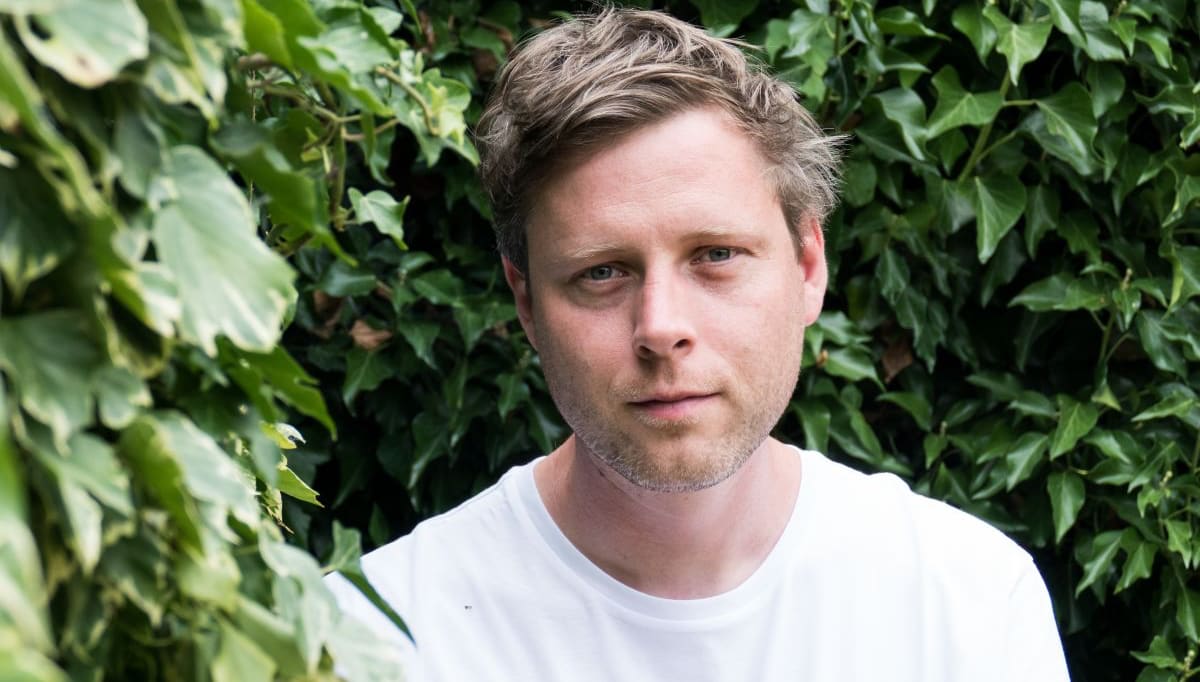You are viewing your 1 free article this month. Login to read more articles.
Max Porter | 'I know people read weird and unlikely things'
I meet Max Porter at The Beaufort Bookshop, near his home in the Larkhall section of Bath. It is a cosy, new-ish store (open for around 18 months, about as long as Porter and his family have lived in the city), but it is already something of a community hub, with people popping in for a chat as much as a browse. Porter is clearly happily ensconced in that community, bantering back and forth with the customers and Beaufort’s owner, James Thomas.
Later, Porter kindly offers me a lift back in to the centre of Bath, joking that "we can take the Dylan Thomas car". Porter’s 2015 début, Grief is the Thing with Feathers, was monstrously successful critically and commercially, shifting more than 110,000 units through BookScan and earning him a raft of literary gongs, including the Books Are My Bag Readers’ Award, the PFD/Sunday Times Young Writer of the Year Award and the Dylan Thomas Prize—the £30,000 bounty of the latter he used to splurge on a new car. Splurge is not quite right; that suggests the extravagance of a flashy hot rod. No, the Dylan Thomas-mobile is a sensible people-carrier which Porter and his wife use to ferry their three children around (as one might imagine, with three boys under the age of 10 the interior resembles a crime scene).
I’m pleased with the way people were moved and engaged with Grief..., and the early response to Lanny. But I don’t think I want to become a writer who people mainly respond to by saying how much my books make them cry.
The success of Grief..., an "inexplicable perfect storm", still takes Porter aback. The experimental novel is part polyphonic fable, part essay on mourning, with one character a man-sized crow. On the surface, not an easy read. It’s less a walk up Snowdon, as Man Booker judges’ chair Kwame Anthony Appiah said of this year’s "difficult" winner, Anna Burns’ Milkman, and more like climbing the Eiger. Porter says: "Sometimes I wake up and think, ‘Did that really happen?’ I remember thinking, with my publisher’s hat on, that if we were really lucky and got a nice tail wind, maybe a couple of prize shortlistings, we might manage to sell 6,000 copies. But as a reader it wasn’t all that surprising, because I know people read weird and unlikely things and there is no barrier to access for certain types of literary experimentation."
He has done so well with Grief... that has he chucked the day job, leaving Granta/Portobello after seven years. He had a good run there, editing the likes of Patrick deWitt, Sarah Moss and two Man Booker champs (Eleanor Catton and International award winner Han Kang). "I loved my job and it’s a wrench to leave," he says. "Granta phenomenally supported me and my lifestyle these last couple of years, and it’s nice to be leaving as an author, rather than for another publisher and taking a lot of authors with me. I’ll miss so many things, like covers meetings. Or that long-term thing where you do multiple books over the years with a person and they grow as a writer and you grow as an editor.
"But it really flattened me last time doing the author tour while doing my job. There were too many voices in my head. I wanted to write this book, to honour the publishers’ commitments to it, and do a proper tour."
Ongoing experimentation
Porter’s follow-up is Lanny, which in many ways doubles down on the experimentation of his début, as it is again a multi-voiced narrative with a large helping of fabulism. The book opens with Dead Papa Toothwort, an ancient Green Man-esque folkloric figure, awakening in a small village outside London. Dead Papa Toothwort is, at first, a benign observer of the town—he can hear all the people’s conversations—but he is particularly drawn to the bright and artistic boy Lanny; Lanny’s psychological thriller-writer mother; his detached and largely absent father; and Mad Pete, a famous artist with whom Lanny takes art lessons. Then tragedy strikes, and the whole village begins to fall apart.
The book plays with the conventions of the novel, not just in structure but in format. When Dead Papa Toothwort hears the villagers’ conversations, the reader sees them as italicised, wiggly snippets which curl, spiral and criss-cross around the page. Porter is keenly aware that experimentation might put some off—"just look at the one-star reviews of Grief... on Amazon"—but he chafes a little at the whole "difficult books" debate. He says: "There is a culture of snobbery, to do with accessibility. I like difficult books. I like easy books. I like all books and I wouldn’t dare tell anyone what to read. We have a culture of anti-intellectualism and it has affected the way we speak about books, because even [as recently as] 40 or 50 years ago, people of all reading tastes and classes would read relatively challenging books. The sales figures of Milkman are a testament to the fact that many customers in the shops don’t give a shit if a book is supposedly ‘difficult’."
Text formatting aside and the sort of Greek chorus that makes up the bulk of the book’s middle section, Lanny is arguably more straightforward than Grief..., with a narrative arc that will be resolutely familiar to viewers of "Broadchurch". It has a delicate balance of laugh-out loud funny moments, with a raw and searing look at the difficulty of marriage, parenting and being an outsider. Plus, as the setting is a typical English village undergoing a challenging event, Lanny does take on something of the state of the nation novel—which will be perhaps underscored as the book will be published when the UK is scheduled to finally withdraw from the European Union.
Porter says: "That’s not the point of a novel but I knew that I would be writing it into an atmosphere where people are very attuned to Brexit." Porter is "horrified" by Brexit, but Dead Papa Toothwort, who has watched over England since before the Romans, might actually bring some comfort to nervy Remainers. "Lots of people who have read it say that it makes them think a lot about Brexit in the longevity of history, and what seems very shocking, upsetting and very tribal right now in fact settles down to just be part of what has always been English life. It’s nice that it’s being read that way, and perhaps a widescreen-cinematic breadth of vision is what people are relating to."
Setting the stage
March is a big month for Porter. A few weeks after Lanny is released, the stage version of Grief..., adapted by Enda Walsh and featuring "Peaky Blinders" star Cillian Murphy, will get its London début. Porter is already circling around the next book, which will be medieval or about "the madness and the barbarity of modern life if viewed from a medieval perspective". He has a "wall at home of X-rays of saints’ coffins, pictures of Saint Eustace’s foreskin and scribbles of the mad plots I have. I keep looking at the wall as if I’m trying to solve a crime."
The next book may be less intense, though. He says: "I want it to be funny. I’m pleased with the way people were moved and engaged with Grief..., and the early response to Lanny. But I don’t think I want to become a writer who people mainly respond to by saying how much my books make them cry."










